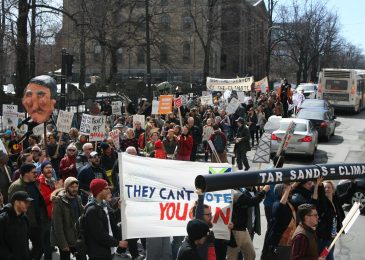Did you read about the recent meeting of Atlantic Canada environment ministers with their federal counterpart, Catherine McKenna? The articles I saw, while perhaps intended to portray a unified effort to stop climate change, also highlighted significant differences.
What seems clear is that Ms. McKenna understands the urgency of acting decisively to reduce Canada’s carbon emissions, while Nova Scotia minister Margaret Miller is carrying a less encouraging message. Actually two messages: 1) we are doing enough already; and 2) flexible emissions targets are needed because our situation is unique. These messages, which are long past their “best by” date, convey a worrisome misunderstanding of current reality.
After decades of dancing around it, isn’t it time we owned up to the truth about climate change?
Truth #1: Our old rules don’t apply.
We have a tried and true method of solving shared problems. We research the issues, gather around, hear all perspectives, and find a compromise. While this works for most problems, climate change is unique. The science of physics is with us at the table, and it has brought new rules.
There is no compromising with the laws of physics. Either we use them to achieve the emissions reductions required to stabilize the climate, or we soft-pedal them and reap the consequences. The choice is ours, and if we act boldly so are the rewards.
Truth #2: There’s a new bottom line.
Thankfully, we don’t have to choose between environmental and economic progress—we have the tools to achieve both. One of them, carbon pricing, may well be the key to our future. It works organically within our market economy, using a rising price on high-carbon energy sources to replace them with low-carbon alternatives.
And, contrary to what you’ve heard, it is not simply a tax. Carbon pricing can generate revenues to reduce existing taxes, provide transitional assistance to local businesses, support the less well off, and fuel creation of the new technologies, industries, and jobs the market will demand.
As with all human endeavors, progress will come with costs. But here’s the bottom line: a livable climate, created by a low-carbon economy, is more valuable than whatever it may cost us to achieve it.
Realizing this, the Trudeau government is preparing to introduce a carbon price as a central element of its climate change plan. Our provincial government and some private sector leaders oppose this, viewing it as a threat to our fragile economy—while neglecting to note that the economy is fragile largely because it was built for a past that will never return.
We must demand better from them. A future of economic and environmental sustainability is taking shape across our country, and smart carbon pricing can help Nova Scotia thrive in it.
Truth #3: We owe our children.
There is an even stronger, deeper reason to act on climate change: we love our children.
Whether we’re parents, grandparents, aunts, uncles, or neighbours, we want our youngsters to be safe, happy, and successful. We demonstrate this by providing sunscreen in summer and warm coats in winter, by helping with homework and cheering achievements, by offering guidance and readying for adulthood. It is what grown-ups do for those in their charge.
Some acts of love require joining together in common cause. Our forebears stood up against aggressors abroad, wove an inclusive social safety net, and gave us the Charter of Rights and Freedoms. It now falls to us to be able to give our children something even more precious: the nurturing climate that makes life possible.
Truth #4: We can do it.
As beneficiaries of modern life we have helped create this massive challenge, and we must do everything we can to put things right. It will require the best in us—the Canada that is committed to being a force for peace and justice and the Nova Scotia that finds meaning in the land and sea and strength in community—and it won’t be easy.
But if we own up to the truth, summon our best, demand more from our leaders, and remember whose future we hold in our hands, we can beat climate change.
Let’s get going. It’s time.
David Henry is a member of the Halifax chapter of the Citizens’ Climate Lobby Canada.




